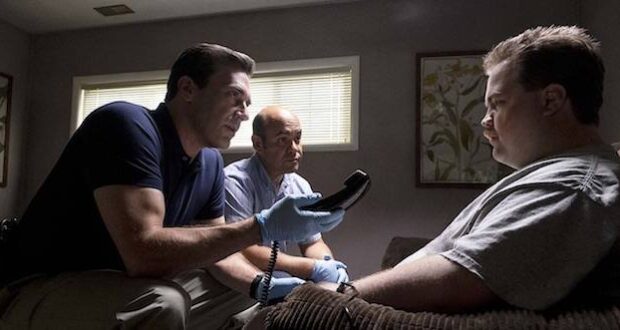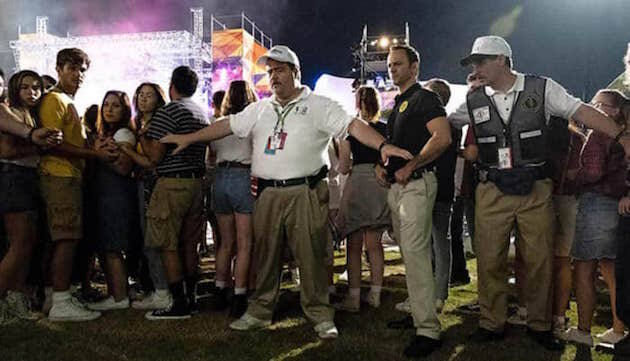Richard Jewell just wanted to help people.
Ever since he was a boy growing up in Georgia, Richard looked up to law enforcement. While other kids were dreaming of becoming astronauts or basketball stars, Richard wanted to wear a badge, and for a time he did (until he was fired). Since then, he’s been a security guard off and on, which he likes just fine when a job comes along. But Richard always imagined that he was meant to do something more with his life. Something better. Something bluer.
Sure, he doesn’t look like a police officer: He carries a few extra pounds. But his ample girth is paired with unmatched enthusiasm. He reads police manuals in his spare time. He’s a better shot than Wyatt Earp ever was. And Richard believes it’d be just a matter of time before he gets another opportunity at wearing a real police badge again.
READ: Our top 5 family picks
So when the Olympic Games come to Atlanta, with their overwhelming need for security personnel, Richard thinks it just might be his ticket back in the game. Maybe he’s just a security guard. But he’ll be the best one he could be.
CAST: Paul Walter Hauser as Richard Jewel; Sam Rockwell as Watson Bryant; Kathy Bates as Barbara “Bobi” Jewell; Jon Hamm as Tom Shaw; Olivia Wilde as Kathy Scruggs; Ian Gomez as Agent Dan Bennet; Nina Arianda as Nadya
DIRECTOR: Clint Eastwood
DISTRIBUTOR: Warner Bros.
REVIEWER: Paul Asay
On July 27, Richard shoos off some drunken kids from the side of a building when he spots an unattended backpack in Atlanta’s Centennial Park, where the Olympics’ nightly concerts are held. When he points it out to police on scene, they figure it’s full of beer or snacks for the kids. With so many visitors in Atlanta, some of ‘em are bound to leave their belongings behind. To think it’s a bomb? That’s just crazy, the cops say.
“I’d rather be crazy than wrong right now,” Richard says.
Turns out, he’s not crazy. And he’s not wrong. The experts find three massive pipe bombs. Minutes later, they explode: Two people die. More than 100 are injured. But it could’ve been worse, much, much worse, had it not been for Richard Jewell.
For three days, the security guard is a hero.
But soon the FBI begins to wonder: Is he? Agents Tom Shaw and Dan Bennet are determined to find out.
The president of Piedmont College tells tells them that Richard was trouble when he worked for the school, with a file full of complaints. An FBI profiler believes that Richard fits a “lone bomber” archetype: a frustrated, wanna-be police officer who plants a bomb just so he can discover it later — and then soak in all the accolades.
But Shaw and Bennet aren’t the only ones looking for a bomber. Kathy Scruggs, bulldog reporter for the Atlanta Journal-Constitution is, too. She and Agent Shaw know each other. Know each other well. She knows a well-placed word and a well-timed touch will pry her scoop loose — the identity of the prime suspect. No sacrifice, no matter how intimate, is too great for her next front-page splash.
Richard Jewell just wanted to help people. And he did.
Just wait ’til he gets his reward.
The Richard Jewell in Richard Jewell is a hero — one with his share of faults and quirks, to be sure, but one to whom many owe their lives. And as he goes through the bombing aftermath’s earliest stages, he’s humble about his role. He was just doing his job, he tells a reporter: The real heroes are the policemen who risked their own lives creating a perimeter and diving headlong into the bomb’s bloody aftermath. Richard even gives credit to the drunken kids he was chasing, too: Had they not knocked the bag over, the bomb would’ve sprayed its contents (nails and screws) out, rather than up. Many more might’ve been injured or died.
When Richard goes from hero to suspect, though, he and the few folks in his inner circle show their true qualities. Richard’s mother, Bobbie, fears for and suffers greatly for her son. “I don’t know how to protect you from these people,” she weepily tells him. His lawyer, Watson Bryant, was a former associate of Richard’s — one of the few, Richard admits, who treated him like a real person. And he fills the same role here, doing his best to humanize a man being demonized in public.
As for Richard himself … well, he cooperates with the authorities to a literal fault (much to Watson’s exasperation). He helps his mom soldier through this difficult time, too. And he carries himself with a modicum of grace, rarely losing his temper. It’s impossible to escape the reality that underneath all his oddities and foibles, he’s just an honest-to-goodness nice guy. He can’t be anything but.
Let’s not forget about the story’s designated “villains.” Tom Shaw, the FBI agent pursuing Richard with the most enthusiasm, does so out of a legitimate desire to find the bomber. The bomb went off on his watch, after all, and he pursues who legitimately seems, at first, to be the most likely culprit. His is a sin of excess enthusiasm and dogged determination — qualities that in many another cops-and-criminals-based movie, makes the pursuant a hero, not a villain. (Indeed, you could argue that he and Richard share some of the same vices.) And while reporter Kathy Scruggs’ original motives are not so honorable, she too wants to find the real culprit. When she begins to doubt Richard’s role in the bombings, we see her regret for her own role in defaming him.
Stories, particularly visual stories like movies, are funny things. Some may want to, say, warn about the evils of alcoholism. But to tell that story, you have to show lots and lots of drinking. Movies that decry violence are often necessarily guilty of portraying that same violence.
The irony at the heart of Richard Jewell is a bit more insidious, in a way. The movie wants us to show how the FBI and the media defamed not only an innocent man, but a man who should’ve been praised as a hero. But in so doing, Director Clint Eastwood is alleged to have defamed a real-life reporter, Kathy Scruggs, for sleeping around to nail down her own stories. “No one has ever said Kathy did anything like that,” said Kevin Riley, the Atlanta Journal-Constitution’s current editor-in-chief. And unlike Richard Jewell, Kathy is in no position to offer a defense: She died in 2001 of a prescription drug overdose.
I don’t think it was necessary to depict the reporter sleeping around to drive home the point that the press was at least partly at fault for what happened to Richard Jewell. But I wish that if Eastwood wanted to feature such a duplicitous reporter, he would’ve used a composite character, because the controversy surrounding Scruggs detracts from what is otherwise a strong and thoughtful, if profane, movie.
Richard Jewell warns about the dangers of profiling anyone. Eastwood’s latest suggests that judging someone based on appearances and assumptions can lead to injustice and tragedy. And even when justice is ultimately served, the consequences can still linger. Take Richard Jewell, whose name was officially cleared three months after he was accused (and who quietly celebrated, the movie suggests, when the real bomber confessed six years later). But even though he was vindicated, I didn’t immediately remember — until watching the movie’s trailers — whether the real Richard Jewell was guilty or innocent. Accusations of wrongdoing — even if they’re just that, accusations — tend to linger.
Richard Jewell is a sad, gripping and sometimes surprisingly funny film that resonates in our current culture of what is real news and what isn’t.
–Paul Assay
 Metro Voice News Celebrating Faith, Family & Community
Metro Voice News Celebrating Faith, Family & Community










